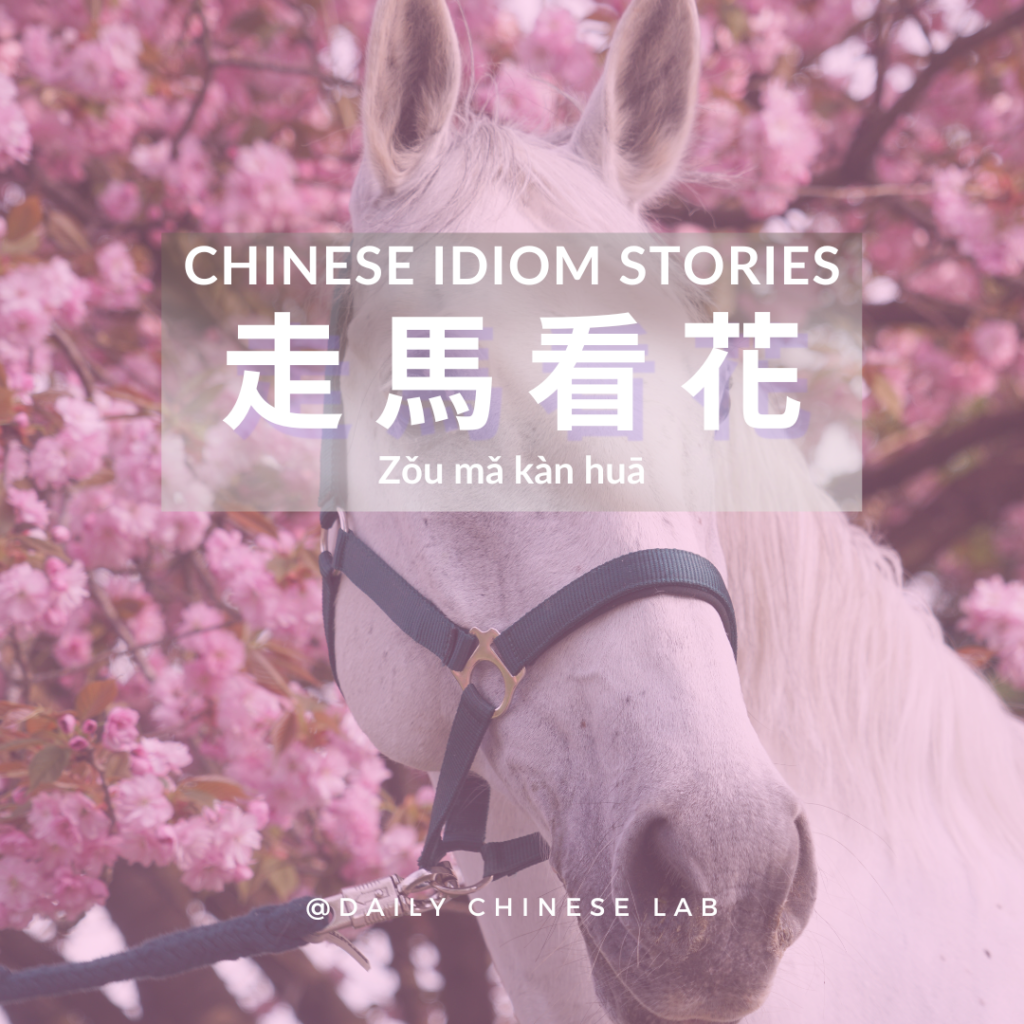Idiom: 走馬看花 (Zǒu mǎ kàn huā)
Literal Meaning: Looking at flowers while riding a horse.
Explanation: means to observe things only superficially, similar to the English phrase “to take a cursory glance.”
Chinese Idiom Stories
The Origin of the Chinese Idiom “Walking a Horse to View Flowers”
The Chinese idiom “walking a horse to view flowers” (走馬看花, zǒu mǎ kàn huā) originates from a poem by the Tang Dynasty poet Meng Jiao: “Spring breeze, proud heart, and swift horse, one day I saw all the flowers of Chang’an.”
Meng Jiao, after years of studying, finally passed the imperial examination and became a scholar. Overjoyed, he rode his horse through the city of Chang’an, admiring the beautiful spring flowers. The poem captures his excitement and joy at that moment.
Over time, the phrase “walking a horse to view flowers” came to be used to describe someone who looks at things quickly and superficially, without going into depth.
「走馬看花」這句成語,源自唐朝詩人孟郊的詩句:「春風得意馬蹄疾,一日看盡長安花。」
孟郊在中年時,終於考中進士,內心充滿喜悅。於是,他騎著馬在長安城裡到處遊覽,看著滿城的春花,心情非常愉快。這句詩描繪了他當時意氣風發、心情舒暢的情景。
後來,「走馬看花」這個成語就被用來形容人們快速地、粗略地觀看事物,而不深入了解。
Idiom Example Sentences
- 他這次歐洲之旅,行程太緊湊,只能走馬看花,無法深入了解各地的文化。
- Tā zhè cì Ōuzhōu zhīlǚ, xíngchéng tài jǐn còu, zhǐ néng zǒu mǎ kàn huā, wúfǎ shēnrù liǎojiě gè dì de wénhuà.
- His European trip was too rushed, so he could only have a cursory look at each place without delving into the local culture.
- 他對這本書的內容只是走馬看花的看過,並沒有真正掌握。
- Tā duì zhè běn shū de nèiróng zhǐ shì zǒu mǎ kàn huā de kànguò, bìng méiyǒu zhēnzhèng zhǎngwò.
- He only skimmed through the book without really grasping its content.
Practice Exercise
- Create a sentence using “走馬看花” to describe someone who rushes through tasks.
- Example: 你不要走馬看花,這份文件需要仔細檢查。
(Nǐ bùyào zǒu mǎ kàn huā, zhè fèn wénjiàn xūyào zǐxì jiǎnchá.)
Don’t just glance over it, this document needs careful review.
- Example: 你不要走馬看花,這份文件需要仔細檢查。
Multiple Choice Questions
Which scenario best represents “走馬看花”?
A. Reading a book thoroughly.
B. Quickly skimming through a museum without reading the descriptions.
C. Listening attentively to a lecture.
D. Preparing in detail for a presentation.
Correct answer: B









